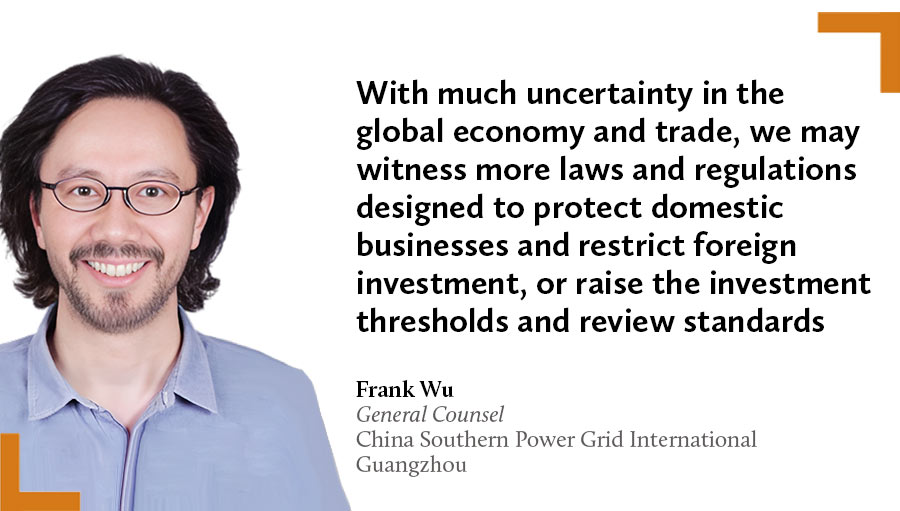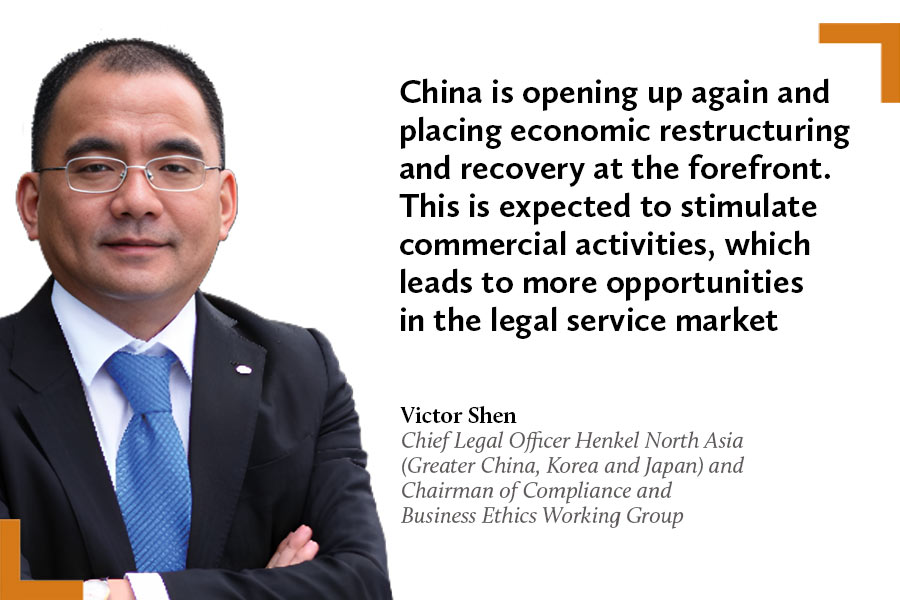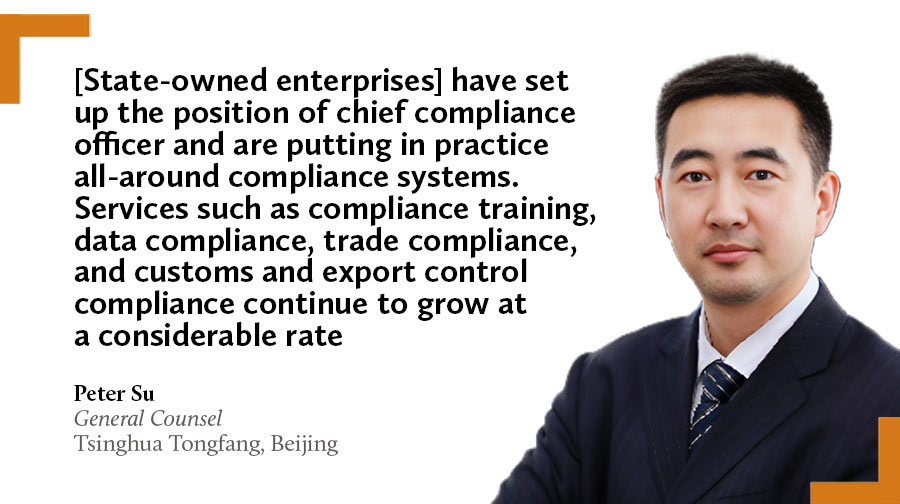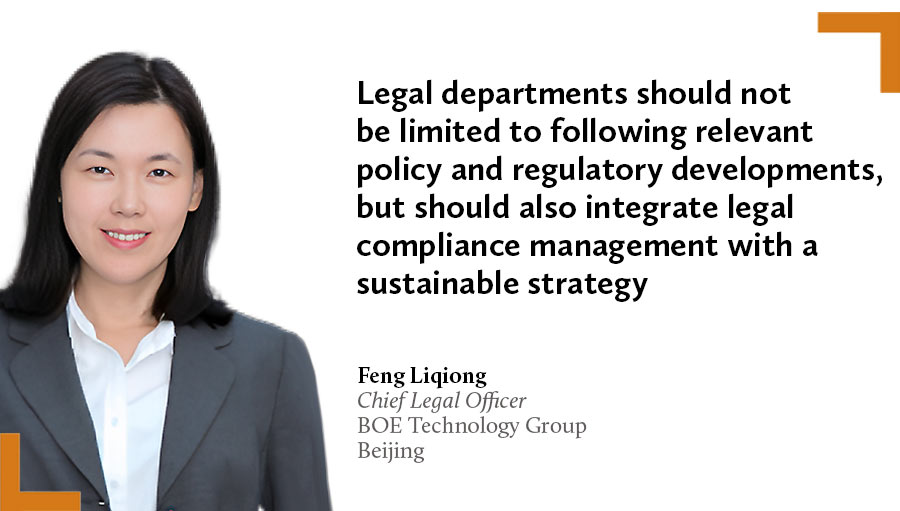Years of market disruption and uncertainty have left China’s business warier but wiser. Anticipating a year of revival and growth, in-house legal heads prioritise sustainability of the future over a speedy compensation for the past. Kevin Cheng reports
“Chance favours only the prepared mind,” said Louis Pasteur, celebrated French chemist and microbiologist in the 19th century. Much like his germ theory and fermentation studies, the famous quote has aged like fine wine.
What makes the phrase so much easier said than done is that sometimes, as the past few years have reminded us, we have to prepare for the unpreparable, events that seem unpredictable and out of control but hefty enough to shake the world.
The pandemic was one such event. With a swift change of tactics around the turn of the year, China loosened its nationwide covid-19 restrictions and downgraded it to a class B infectious disease, which made 2023 the unofficial Year One of the “post-pandemic era”.
Covid-19 is by no means gone, and many public and personal health precautions remain necessary, but businesses at long last are able to look past the colossal shadow it has cast when contemplating their immediate future.
While many are eager to sail full speed ahead and regain lost territory, in-house counsel across various industries have instead cautioned patience and restraint. After all, the lingering geopolitical uncertainties are no less worrisome and the global regulatory landscape is no less fickle. Besides, as we have learned the hard way, speed can be a poor substitute for quality.
READING THE NEW ROOM
While the pandemic was a blow to every facet and corner of the economy, some sectors nevertheless drew shorter straws than others, with entire industries threatened to be wiped off the map. Tourism and entertainment businesses, such as cinema, were unfortunately among the first to be deemed disposable, even dangerous, by both society and consumers. On the flip side, resurgence in these fields, looked on as clear signs of recovery and a return to normal, feel particularly palpable and uplifting.
According to a report by China’s Ministry of Culture and Tourism, domestic trips taken during the seven-day Chinese New Year holiday in January 2023 amounted to 308 million, a 23.1% increase over the previous year and representing 88.6% of the 2019 statistic. Domestic tourism revenue also ramped up 30% year-on-year to RMB375.8 billion (USD54.7 billion), around 73.1% of the 2019 equivalent.
As for the silver screen, boosted by festival season blockbusters such as Full River Red and The Wandering Earth 2, cinemas across China raked in RMB10 billion by the end of January, making 2023 the fastest year to reach this milestone. “The entertainment industry is more active than most in the tertiary sector and is particularly susceptible to fluctuations in people’s consuming willingness,” observes Li Jingjue, legal director of Huayi Brothers Media.
Li points out noticeable changes in consumer behaviour during the past three years, namely fewer cinema-going trips, higher requirements for film quality, and a stronger penchant to obtain video-based entertainment from online channels, especially short videos. The cinema resurgence is hopefully a harbinger for a comeback of offline activities, and a sign that the pandemic’s impact on daily lives can now be minimised.
Unfortunately, it is not just the airborne virus that has kept the world collectively holding its breath, with the war in Ukraine raging past its first anniversary, and tensions between the world’s greatest powers mounting to uncomfortable levels. To multinational companies and participants of cross-border trade, these are delicate issues where developments may make or break their prospects.
“With much uncertainty in the global economy and trade, we may witness more laws and regulations designed to protect domestic businesses and restrict foreign investment, or raise the investment thresholds and review standards, which may discourage or deter both inbound and outbound investments,” cautions Frank Wu, general counsel at China Southern Power Grid International (CSGI).
To counter these adversities, Wu stresses the importance of conducting legal environment analysis on key investee countries, especially in terms of, among others, foreign investment access, tax adjustments and regulatory policies. “Companies should begin working on countermeasures to make sure that risks in overseas investments and related projects are under control and manageable,” he advises.
Echoing these concerns, Victor Shen, chief legal counsel of Henkel Greater China & Korea, cites nationalist and protectionist-driven legislation and geopolitical pressure as major hurdles moving forward, as they will add to the challenges in both compliance environments and external regulatory frameworks of commercial transactions.
Among the numerous areas of legal service expected to benefit from the ramped-up market activities, dispute resolution might raise a few eyebrows due to the potentially negative connotation that comes with the territory.
Ironically, disputes is one area that in some ways may have benefitted from, rather than been compromised by, the stagnant cross-border trade of the past few years. The numerous contract disruptions and payment defaults, whether due to breakage of financing, supply chain crisis or politically driven sanctions have, to their credit, contributed to the creativity and growing sophistication of global dispute resolution mechanisms, as leading courts and arbitration institutions worldwide rose to meet the new dilemmas, setting valuable precedents in the process.
China’s expanded capacity for cross-border litigation and arbitration is certain to come in handy in view of renewed commercial activities across the border, which goes hand in hand with mounting risks of discord.
Sun Chuntao, director of legal department (policy and regulation) at the China State Shipbuilding Corporation (CSSC), advises companies engaging in these ventures to not only honour their parts of contracts, but also strengthen legal review for contracts and agreements in international economic and trade co-operations.
Perhaps one of the most distinct traits of pandemic-era disputes is the frequency of force majeure being cited as a reason behind non-performance and grounds for exemption from liability. This trend, according to Sun, is quickly approaching an end. “With the pandemic policies optimised and its effects diminished, it will be increasingly difficult to cite the pandemic as a force majeure event affecting contract performance,” he says, advising attentiveness to the timing in contract performance and avoidance of defaults.
But Li, of Huayi, reminds fellow entertainment players not to underestimate the “long covid” symptoms in business operations. “Just because the policies and macro situations have improved, it does not mean the turnover difficulties arising from production stagnation and marketing delays, the resultant deterioration in operating conditions, contract defaults and subsequent disputes will also go away,” she says. “The legal department must work with business units, or even take the lead in addressing these issues.”
HOPES AND HAZARDS
Unsurprisingly, there is widespread growing appreciation for risk forecast and management, with particular attention to corporate survivability in emergencies. In-house counsel, upon whose shoulders such responsibilities tend to fall, are in general optimistic about the legal and regulatory changes the year will bring, as well as their potential effects on the market.
But as Lu Yuping, executive deputy director of the special foreign company committee at Shanghai Corporate Counsel Association, warns: “2023 is a year full of opportunities, but nobody is going to gift-wrap them for us. We must fight to earn them.” Lu recently retired from his position as the legal director of Toto (China).
There is general excitement at China’s renewed national focus on economic development and commercial vitality. “After three years, China is opening up again and placing economic restructuring and recovery at the forefront,” says Shen, of Henkel. “This is expected to stimulate commercial activities, which leads to more opportunities in the legal service market.”
On 21 February, the applications of 16 companies seeking to be listed on the main boards of Shanghai and Shenzhen stock exchanges were accepted by the two bourses, signalling the official implementation of an across-the-board registration-based IPO system in China’s capital market.
China traditionally adopts an approval-based system, where IPO applications are submitted to the China Securities Regulatory Commission (CSRC). The registration-based experiment began with Shanghai’s Star Market, followed by ChiNext and the Beijing Stock Exchange. The two main boards are now the last to join the club.
Essentially “giving the right of choice to the market”, the registration-based system focuses on information disclosure and allows stock exchanges to take the lead in reviewing applications, therefore improving transparency and efficiency.
There is also considerable anticipation in the capital market for the revised Company Law, for which the National People’s Congress released a second round of draft revisions at the end of 2022 to solicit public opinions. “Strengthening the governance of listed companies is one of the priorities of this amendment,” says the CSSC’s Sun, “including empowering the CSRC to formulate rules relating to independent directors, clarifying the functions of audit committees, and prohibiting the illegal holding of public shares.”
The revision is the sixth since the law’s original implementation in 1993, and is expected to come into effect this year. “It is foreseeable that the adoption of the revised Company Law will further improve the capital law system,” Sun says.
As the domestic IPO market grows more attractive, companies planning to go public may also find the path overseas to be slightly less bumpy. In December 2022, the US Public Company Accounting Oversight Board (PCAOB) concluded that it was now able to inspect and investigate accounting firms in mainland China and Hong Kong, vacating its prior determination to the contrary.
While this development is far from an all-clear for the more than 100 US-listed Chinese companies facing delisting by 2024 if the long-time “audit paper review” discord cannot be allayed, it was nevertheless a boost of confidence.
INDUSTRIES TO WATCH
According to a February 2023 report issued by Deloitte, China’s new energy sector — covering the power battery, clean energy generation, hydrogen and fuel cell, energy storage, wind power and photovoltaic sectors — recorded RMB340 billion in disclosed investment and M&A, a year-on-year increase of 47.9%; and 519 transactions, a year-on-year growth of 16.1%.
Allen Liang, general counsel of Sembcorp China, believes that 2023 will witness more new energy M&A, which will elicit greater demand for legal services in this area. However, growth in the sector has also attracted much regulatory scrutiny.
Since October 2022, Chinese regulators began to disclose results of what many refer to as the toughest ever review of renewable energy subsidies that started in March, designed to strengthen the management of renewable energy generation subsidies and map exactly how they are used.
“Companies interested in acquiring new energy assets are advised to pay attention to any historical issues in the stock of assets, and evaluate if they will affect the subsidy review,” says Liang. “For new energy companies, if the review results are less than satisfactory, profits may be seriously affected.” More results from the subsidy review are expected to be unveiled this year.
Self-examination has become a required course for many companies, and the general awareness for compliance has never been higher.
Peter Su, general counsel of Tsinghua Tongfang, observes steady growth in demand for compliance-related legal services for state-owned enterprises. “They have set up the position of chief compliance officer and are putting in practice all-around compliance systems,” he says. “Services such as compliance training, data compliance, trade compliance, and customs and export control compliance continue to grow at a considerable rate.”
Like compliance, companies are starting to realise the importance of consistency in brand and IP protection. “Protection of brand and IP is not a seasonal custom come every 15 March [World Consumer Rights Day] or 26 April [World Intellectual Property Day], but should be upheld at all times,” says Lu.
China’s revised Copyright Law came into effect in 2020, but cracks between on-paper and in-practice articles have begun to appear. Accordingly, Li believes that updates related to the implementation of the Copyright Law will soon see action.
On the technology front, digital economy, cryptocurrency and AI are injecting much vitality to the market, but at the same time raise complicated legal issues that challenge the norms.
Feng Liqiong, chief legal officer at BOE Technology Group, predicts that policies and laws related to the development and governance of the digital economy will be introduced in a more intensive and efficient manner, and that compliance management will be one of the extraordinarily important players in this space.
“Through compliance management, companies may take the initiative in co-operating with regulators, overcoming technical barriers and implementing the governance policies,” she says. “They may also develop a code of ethics for technological applications, setting a higher standard for ‘technology for good’.”
You must be a
subscribersubscribersubscribersubscriber
to read this content, please
subscribesubscribesubscribesubscribe
today.
For group subscribers, please click here to access.
Interested in group subscription? Please contact us.





























